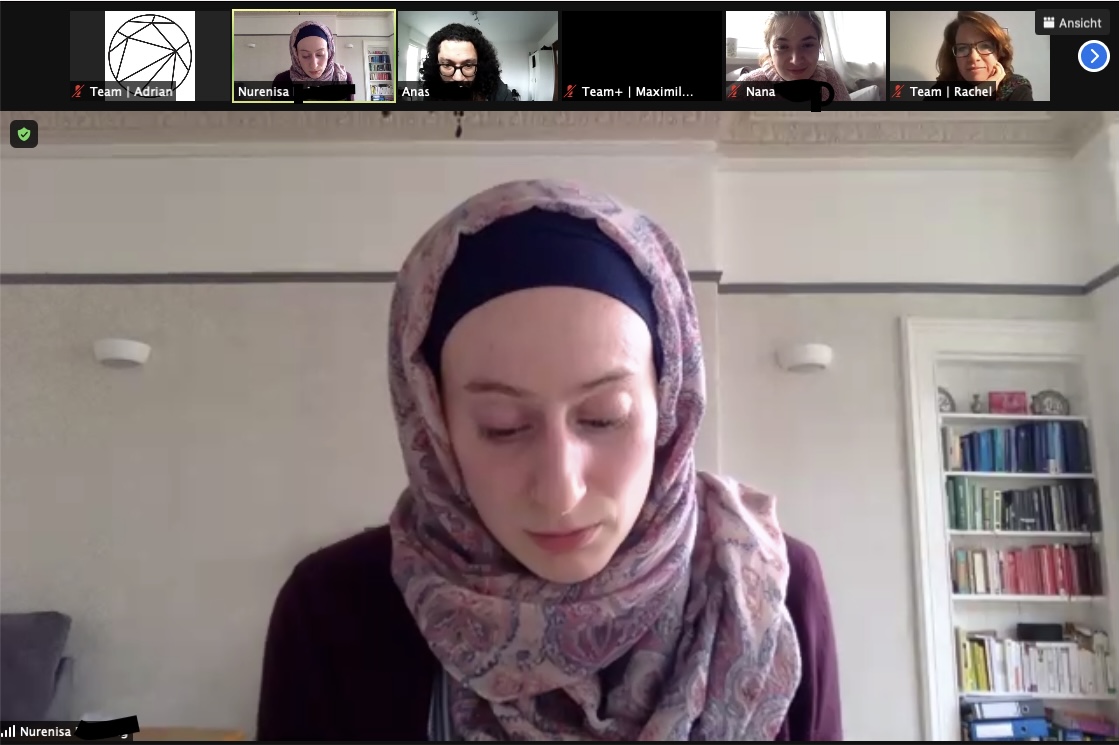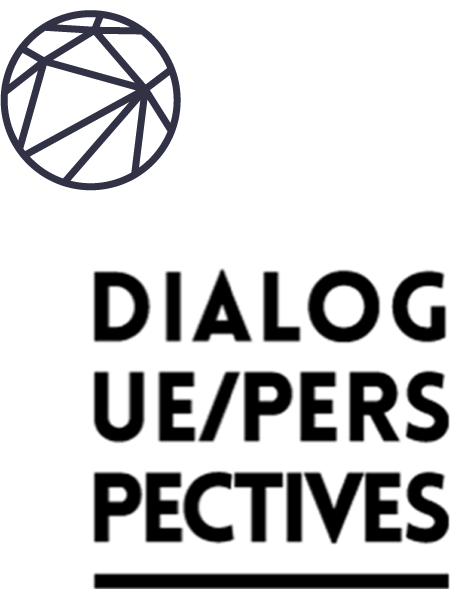Retrospect: Spring Seminar 2021
EUROPE AFTER COVID: Smashing the „normal“ – old new or otherwise – by all means necessary (10-14 March 2021)
The COVID-19 pandemic is deepening the already virulent crisis for European democracies and the livelihoods of all peoples worldwide. The virus strikes a European society that is already ill from the increasing drifting apart of people and states and the abandonment of a concept of society based on solidarity. When if not now is the moment to take a step back and address the changes we desperately need and want for a post-COVID-era in Europe and beyond?
At the centre of the spring seminar 2021 ‘EUROPE AFTER COVID: Smashing the “normal” – old new or otherwise – by all means necessary’ was the question of how concrete demands for a more just, pluralistic post-Covid Europe can be developed and transferred into political discourse. After five intensive days together one thing became clear: the diversity of our participants is one of the keys to solving the problems we face. There is no way around them, and the diversity in Europe which they represent, in the quest for a fairer and more inclusive post-Covid Europe.
In developing a seminar concept that is suitable to achieve the programme’s goals digitally, we focused on a central point of feedback from the participants: the wish for even more concrete seminar topics, from problem analysis to problem solving. Accordingly, and in intensive cooperation with two of our seminar leaders, Maximiliane Linde and Neta-Paulina Wagner, the team developed a methodological-didactic concept with seminar modules that build on each other. This approach trains the participants’ ability to argue and negotiate their own demands, while also bringing the seminar participants together in intensive working phases. The central aim of this process was to develop, negotiate, and prioritise a number of concrete demands for the political, civil, and legal recognition and implementation of the pluralistic reality of European societies. The diverse programme therefor consisted of panel discussions, reflection rounds, guided closed-group working phases, religious/worldview practice, as well as informal formats for encounters and discussions on the Wonder.me platform.
The Seminar Days (10 – 14 March 2021)
The welcome session and introductory remarks by our project leader, Johanna Korneli, and the project officers Rachel de Boor and Gil Shohat, kicked the seminar off at noon on 10 March. They presented the five central guiding questions for the seminar, among other things:
- What role does our interreligious/worldview dialogue play in the struggle for a shared idea and vision for a post-COVID Europe based on pluralistic coalitions, solidarity, and care?
- How can we make responsible decisions in the pandemic situation without forgetting the urgent necessity of shaping a future, post-COVID Europe?
- How can we work to ensure that our seminar topics are implemented in the European political framework?
- What can we learn from the community solidarity we have seen during the pandemic at the local level in relation to the idea of a fair, just, and locally rooted and radically integrative Europe?
- How can the fact that the division of care work within families remains unjust, something that has become so clear during the pandemic, contribute to the realisation that the private is also, in part, political?

Prof. Dr. Dr. Jean Ehret, director of the Luxembourg School of Religion and Society, then provided the participants with his introductory remarks. In them, he emphasised the continued desire to further expand the collaboration between the School and DialoguePerspectives and expressed his looking forward to the moment when the team will finally be able to take its excursion to Luxembourg with the participants.

The afternoon of 10 March was used productively with an input lecture by Maximiliane Linde and Neta-Paulina Wagner, in which they defined the significance of the current political moment as a critical juncture that opens up space for political change, but only if the actors actively use this opportunity. The group launched into a “fish bowl” discussion of the lecture topic, in which five participants took turns commenting on the topic. In this format, the participants who have been active the longest are repeatedly replaced by those who joined last. This enabled as many participants as possible to take part in the discussion.

In order to provide the participants with continuity from the autumn seminar within the digital space, they then met with their workshop leaders from the autumn (Dr Alexander Graeff, Prof. Dr. Frederek Musall, Neta-Paulina Wagner, Maximiliane Linde, and Gil Shohat) in the following block to talk about the relevance of the topics discussed in the autumn for our current seminar topic.
The first day of the seminar ended with a role play in breakout rooms, in which the participants had to practise formulating arguments from a position (from utopian to pessimist) that had been assigned to them beforehand, even if this position was explicitly not their own. This exercise served to sharpen their argumentation techniques for formulating their own positions in a many-voiced discourse.
The second day of the seminar (11 March) started with religious and spiritual morning impulses on the Wonder.me platform prepared by participants on Lailat Al-Miraj (Mohammad’s journey to heaven), religious practice for Easter, mindfulness exercises, and creative processes.

This was followed by the first of two panels of the spring seminar. Under the title ‘Postcolonial Perspectives on Europe post-Covid 19’, Armelle Chatelier (Foundation for the Memory of Slavery, Paris, France), Nadja Ofuatey-Alazard (Each One Teach One e.V., Berlin, Germany) and Dr. Cátia Severino (Djass – Association of Descendants of Black Portuguese, Lisbon, Portugal) joined in a discussion moderated by DialoguePerspectives project officer Gil Shohat on the colonial heritage in their respective countries and European perspectives on a pluralistic memory of slavery and colonialism in the light of contemporary racism. While the panellists emphasised the continuities of racist discourses and practices from the time of slavery, the establishment of a central memorial to the victims of slavery in Lisbon as well as similar efforts to make the topic of slavery and colonialism more visible in France and Germany, for example, showed that discourse on the politics of remembrance is in motion. They also emphasised the necessity of bringing together country-specific campaigns on a European level. After all, colonialism and slavery were also pan-European projects with transnational interconnections.

After the panel, the participants discussed the insights that were important to them in breakout rooms, followed by a reflection session led by Kristina Schneider, in which the participants discussed the privileges and power structures in our societies and within the circle of participants itself. The session used the Menti survey system to account for the positions of the participants as comprehensively and anonymously as possible.
The second day ended with a joint lecture on the importance of hope and confidence in uncertain times of crisis by the religious advisors Dr. Ayse Basol, Rev. Dr. Kerstin Söderblom, and Rabbi Maximilian Feldhake. Some of our participants continued their informal conversations deep into the night, creating a kind of communal experience even in the digital space.


The third day of the seminar (12 March) focused on feminism and intersectionality. The second panel on ‘Intersectional Perspectives on Feminism and Gender in European Societies’ kicked off the day. Led by Maximiliane Linde (Free University Berlin), the panellists included Prof. Andrea Pető (Central European University, Vienna, Austria) Taya Hanauer-Rechavia (Justus Liebig University, Giessen, Germany), Dr. Lana Sirri (Maastricht University, Netherlands, JJ Bola (author and poet, London, UK), and Julia Winterboer (Catholic University Community, Bielefeld, Germany). After naming urgent current challenges within feminist discourses related to the Corona pandemic, the panelists discussed, among other things, the significance of the concept of intersectionality for feminist debates and following this the relationship between science and activism and possibilities of creating synergies in the struggle for a gender-equal society.


The participants further grappled with these topics in the following seminar module, engaged in concentrated work formulating their own political demands for European society after Covid, which would be the basis for further engagement. These questions served as a framework for the session “Find your demands!”:
- What have we addressed so far? Where does this leave us in terms of our demands?
- What do you deem necessary for a pluralistic European society?
- Why you have this particular demand and how is it potentially influenced by your positionality?
- Do others benefit from your demand (solidarity)?
- What are you willing to compromise or even give up on for a pluralistic future in Europe?
Definite highlights of the religious practice on Friday (#djummahmubarakshabbatshalom) were the session on Islamic Friday prayer prepared by participants with a narration about Salmān al-Fārisī and a recitation of Surah 18 and the lighting of candles for Shabbat led by Rabbi Feldhake, including stories about Shabbat traditions by participants.


During Shabbat (13 March) we unplugged and rested from the digital sphere rfor independent reflection upon the intensive seminar discussions. After Shabbat had ended, the participants came together in groups with fresh minds to discuss their political demands for more participation, plurality competence, and recognition of religious/worldview diversity that they had formulated the day before. Their goal was – following upon the building blocks from the first day of the seminar – to engage in a process of negotiation to pragmatically weight them according to their urgency, but also their political implementation. It became clear that group’s work over the course of the seminar should primarily be understood as the starting point of a continuous working process that will extend over the period of the entire programme year. The final results will be presented at the International Conference in June in Berlin.

At the end of the seminar on Sunday (14 March), following a shared ecumenical prayer service led by Rev. Dr. Kerstin Söderblom with the participants, the group discussed the possibilities for going down this path together. The possibility of setting up joint working groups on topics identified via the working process, in which the participants can also work on their political demands between the seminars, played a major role. This could take place, for example, within the framework of our monthly check-ins between the seminars. At the same time, the DialoguePerspectives team pointed out further possibilities for participants to contribute that already exist within the programme beyond the seminar events. One example is the blog This Is Us – Insights from Our Participants, which was launched in November 2020. Some participants have already provided insights into their research projects, activist, or religious work there.
The seminar concluded with a further reflection round led by Kristina Schneider, together with an outlook for the coming months. A huge thank you to everyone for making the seminar a success – the seminar leaders, the religious advisors and our participants for their energy, their engagement and their contributions.
The spring seminar is behind us, and the summer conference is ahead – we are looking forward to our next steps with our participants and to sharing them with you!




